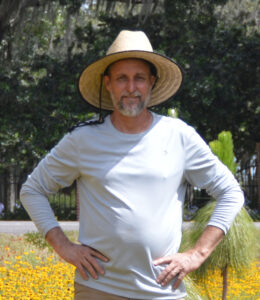 Troy Springer’s love of native plants has fueled his landscape company’s growth. Smart use of Hitachi rentals helped him do more.
Troy Springer’s love of native plants has fueled his landscape company’s growth. Smart use of Hitachi rentals helped him do more.
Landscaping and a love of native plants came to Troy Springer naturally. “I’ve always been interested in wildlife and nature,” says the Tampa, Florida-area native.
Early on, Springer worked for a traditional landscaping company, but like many successful people, he quickly realized he needed to carve his own path to be satisfied.
“I almost got out of landscaping because I felt like what I was doing for other companies was harmful,” Springer says. In particular, he disliked the practice of many traditional landscapers who use plants that may be appealing visually but aren’t native to the area where they are planted. Non-native plants can do one of two things, he says: they can become invasive, or they can fail.
“Then I discovered the native plant societies and got involved,” Springer says. “I studied relentlessly, and I started practicing it, and I got better and better at it. Now I have a pretty good reputation.”
That reputation includes serving as a former chapter president of the Florida Native Plant Society and producing a conference for them. Springer is also the secretary and on the board of the Florida Association of Native Nurseries, the nation’s largest professional native plant network.
Design-build
Today, Springer Environmental has eight employees, working as three different crews. The company’s work is primarily design-build for high-end residential landscaping customers, but they also do some commercial work, such as the landscaping for a new City of Tampa park.
“They needed a native plant specialist, and I was the only game in town,” Springer says. “I have done work with some developers, but I’m more of a custom-build guy because I design my own landscapes. I typically target homeowners directly.”
Springer’s shop sits on a few acres that he is developing into a nursery, where he can demonstrate to customers the beauty and variety of native plants. “Retail is a good fit for bringing in potential customers,” he says. “They can come in and see the plants and some of the work we do.”
Big machine for small company
Springer owns a handful of small tractors used to carry plants in containers and move soil and other materials. But as the size and scope of the landscapes he created increased, Springer knew he would need a bigger machine.
Smaller machines didn’t have the horse power or the weight and balance to carry sable palms and pines ranging anywhere from 15 to 30 feet tall. Some weigh more than a ton. Backhoes and skid steers were too hard on turf, and even compact track loaders didn’t have the weight to counterbalance these big trees.
And planting these trees involves more than just dropping them in a hole. With their long trunks, these trees must be positioned with the trunk perfectly vertical from all angles. The tree is often initially placed and then picked up and repositioned multiple times as Springer and his crewmembers evaluate the line of the trunk. If necessary, the hole may be dug a little deeper or more to one side to get a perfectly plumb tree.
But the company didn’t have the cash flow to support the purchase of a bigger machine. The solution was to rent Hitachi ZW50 and ZW80 wheel load-ers when the job requires it, which is typically several times a year. Springer outfits his rental units with a tree boom, and with the articulating front end of the wheel loader, he can carry and fine tune the placement of the tree with minimal movement of the machine and minimal disturbance of the turf.
Racing connections
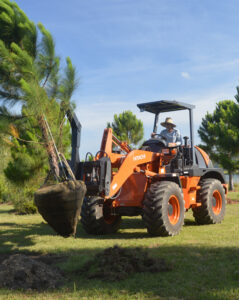 Steve Tuton, salesman for Great Southern Equipment, first met Springer thanks to a shared hobby: racing Mazda Miata sports cars.
Steve Tuton, salesman for Great Southern Equipment, first met Springer thanks to a shared hobby: racing Mazda Miata sports cars.
“I quickly determined his business overlapped with mine and that he could be an occasional user of some of our equipment,” Tuton says.
“Kawasaki didn’t have the small loaders back then, but when the Hitachi loaders became available, I made sure he knew about them.”
The relationship turned out to be mutually beneficial. “Troy introduced me to many other members of our native plant societies, including owners of tree nurseries and landscape tree installers,” Tuton says. As a result, Great Southern Equipment started exhibiting in the local shows for these landscapers and tree growers, he says.
Great Southern Equipment doesn’t do a lot of short-term rentals, but when the machines are available and the customer is known to take care of the equipment, Tuton says they are happy to help. Business owners like Springer will often arrange their schedules so they can do multiple jobs in consecutive days and rent the machine for a whole week to get the most out of it, he says.
“None of the small operators are unimportant to us,” Tuton says. “They all matter. Many companies that were smaller when I started 20 years ago are good-sized companies now. If you spend the time to understand their needs and take care of them, they will keep doing business with you as they grow.”
The old Florida look
Springer’s passion for landscaping and native plants is infectious. “I struggled with this business for years because I had this dream of doing something really good for this state, but we’re just now starting to make an impact,” he says. “Ten or 15 years ago, people thought I was crazy to be planting pine trees and palmettos and putting wildflowers in your yard. But they don’t think it’s crazy anymore. It’s amazing how it has exploded in popularity. Our sales have grown significantly.” A recent photo posted on the company’s Facebook page got nearly 1,750 likes, he says.
Springer’s goal is more than just nice-looking yards and landscapes. As Florida’s population continues to boom, residents have become conscious of its unique heritage and culture. Newcomers and old timers alike have rediscovered what Springer calls the “old Florida,” one of lush gardens and crystal-clear springs. But with more people, environmental pressures increase. Native plants not only help achieve the old Florida look, but maintain it by being the right environmental choice, too.
In a climate with a year-round growing season, invasive and non-native plants can run rampant, choking out native plants, clogging waterways and wreaking havoc on what should be a well-balanced and sustainable ecosystem. Native plants are not only better adapted to the climate, but they provide forage and sustenance for everything from birds and butterflies to the Florida black bear as well.
“In Florida there are so many people coming here, we try to be mindful of quality construction and quality landscaping,” Springer says. “If you can make money improving the quality of the environment, that is a major step in having a higher quality society. It’s just good business.”
This story first appears in Hitachi’s Fall 2021 issue of FOCUS magazine. Download the magazine here.
Pasco Iron and Metal’s Successful Switch to a Hitachi Compact Wheel Loader
Pasco Iron and Metal switched from a skid steer to a Hitachi ZW50 compact wheel loader to create a cleaner, safer, and more productive work environment.
After learning the trade from his father, Matt Goldman started Pasco Iron & Metal in 2007 with just three employees. Today the Land O’ Lakes, Florida, company has grown to employ 50 people. Across its two locations, Pasco operates a fleet of nine trucks, six cranes and five skid steer loaders. Crushers and processing equipment bang away at mountains of incoming and outgoing scrap metal all day long.
“We have two full-time mechanics and one full-time welder and could use two more mechanics,” Goldman says. “But having control over our transportation gives us an advantage over most of our competition. We pay a little bit more for maintenance and service, but that control adds value. And the customers love the service.”
Recycling big time
Pasco recycles a wide variety of metals including iron, stainless steel, aluminum, copper, nickel, brass, and lead. Along with their second location in Largo, they buy old appliances, radiators, batteries, wire, circuit boards, aluminum shavings and all sorts of industrial size lots of scrap metal. The material is dumped in the yard and then processed, typically crushed, or melted into ingots and then sold to companies that will use it to make new products.
In 2013 the company added a railroad spur and started leasing rail cars to deliver large shipments of scrap iron to the ports and other rail terminals. On an annual basis, Pasco Iron and Metal ships 40,000 tons of steel and iron, the equivalent of 500 rail cars. Nonferrous shipments, copper and aluminum primarily, run about 24 million pounds a year.
Taking delivery of this material, processing it, and then loading it onto trucks and railcars and shipping it out again makes for a very busy yard. It’s kinetic, noisy, and nonstop.
Aluminum rain
One of the most challenging jobs in the company is loading aluminum turnings. These are fine strands of aluminum that come off lathes and milling machines, and Pasco regularly receives and processes tons of it. The problem is that when loading these turnings with a skid steer, the bucket is so close to the operator that he invariably gets littered with stray shavings as he dumps the bucket into a truck.
These shavings wind up accumulating in the operator’s lap and pile up so deep in the footwell of the cab that it becomes hard to work the pedals. Operators crawl out of the cab at the end of the day with hundreds of tiny bits of aluminum turnings clinging to their clothing and boots.
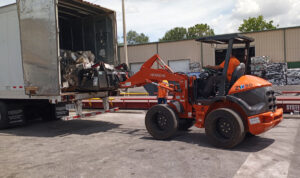 Better way to load
Better way to load
Pasco Iron and Metal decided to try a Hitachi ZW50 compact wheel loader, not only to keep the cab and operator away from the aluminum spillage, but to see how it competed against skid steers in terms of productivity and operating costs.
They didn’t have to look far. They already enjoyed a good relationship with Great Southern Equipment, the local Hitachi dealer, and had bought several cranes from them.
“We called Steve Tuton, our salesperson at GSE, and told him, ‘We know you sell these. What can you do for us?’” says Jimbo Jennings, operations and dispatch manager. “And we got it worked out. We didn’t even look at another one, because of what Steve had to offer.”
“The operator can see more around him on the ZW50. He can see where he is loading. And it has a bigger bucket and can handle more volume than a skid steer”
– Matt Goldman, founder of Pasco Iron and Metal
So far, Pasco operators have had just a few weeks on the Hitachi compact wheel loader, but they like it, Jennings says. With the longer wheelbase the bucket is far enough in front of the cab that stray shavings fall to the ground instead. “It’s working well for them,” he says. “Not only are the operators and the cab staying clean, but the compact wheel loader has a bit more power than the skid steers.”
Right-sizing the machine
Choosing the size of loader was something Pasco did debate. Hitachi offers one size smaller, a ZW30, and plenty of loaders larger than the ZW50. But the ZW50 met all the important criteria.
“The ZW50 isn’t that much bigger than the ZW30 but it has more power and lifting capacity,” Jennings says.
Visibility is another plus. “The operator can see more around him on the ZW50,” Goldman says. “He’s not in a box. He can see where he is loading. And it has a bigger bucket and can handle more volume than a skid steer.”
What’s more, Goldman wanted a machine that could withstand the rigors of the scrapyard. “That’s my biggest challenge,” he says. “We don’t want to be putting out maintenance fires all the time, he says. “If you have a machine down, you’re dead in the water. You’re not going to get those hours back.”
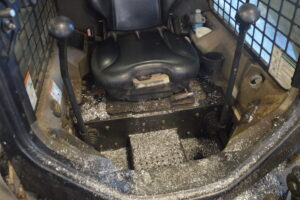 Skid steer vs. compact wheel loader costs
Skid steer vs. compact wheel loader costs
As far as skid steers versus compact wheel loaders, Goldman cites several operating cost advantages. One immediate gain is reduced tire wear
on the expensive solid-rubber tires necessary in scrap yard operations.
“Since it isn’t skidding all day long, the tires should last a lot longer with the articulated steering,” he says. “On our skid steers we’re replacing tires once a year.”
Pasco also had good reason to want a long-lasting machine. Metal scrap yards are some of the most brutal environments a machine can encounter. “We get about five years out of our skid steers, but we should be getting 10 or 12,” Goldman says.
And while compact wheel loaders offer plenty of power, they typically have smaller engines than similar-capacity skid steers. A skid steer puts a lot of its engine power into turning and moving the machine around. The Hitachi compact wheel loader, on the other hand, has an axle, articulated steering, and a differential. This makes maneuvering more energy efficient and frees up additional power for the hydraulics. There’s less load on the engine and as a result, lower fuel use and longer engine life.
A compact wheel loader is initially more expensive than a skid steer, but Goldman says the expectation is that it will be more productive, hold up better and deliver lower operating costs over time.
Small wheel loaders, dependable friends and family, and a central location make Larson Topsoil a premier destination for landscape materials throughout the Tampa Bay region.
In Central Florida landscapers stay busy year-round. To feed their never-ending appetite for materials, Larson Topsoil sells and delivers everything they need in the way of materials mulch, rock, gravel, sand topsoil, potting soil, and shell.
With a small crew including himself, his son and wife and four others, Larry Larson, the company president, dispenses $3-million worth of materials every year using a fleet of small wheel loaders and four Class 8 delivery trucks.
Larson sells to everybody, from homeowners to big outfits, and that means a lot of activity. On any given day they’ll be loading everything from pickup trucks to tractor-trailer rigs. Space is tight in his yard, and the small wheel loaders stay busy.
Visibility and maneuverability
Given this environment, Larson’s latest additions to his fleet, two Hitachi ZW50 loaders, make a lot of sense.
The small wheel loaders’ size (just 5-foot 5-inches wide over the tires) and good visibility work well on a crowded yard. At full reach the bucket pin height (14.5 feet) allows them to load even the tallest haul trucks. And with the company’s offices just yards away from the stockpiles, it doesn’t hurt that the ZW50’s 44-horsepower, Tier 4 Final engines make them the quietest machines on the property.
“In all honesty, I really love the Hitachis. They are sweet machines and they have lots of power.”
– Larry Larson, president of Larson Topsoils
“In all honesty, I really love the Hitachis,” Larson says. “They are sweet machines and they have lots of power.”
Compared to a skid steer, the small wheel loaders’ better visibility is an important factor for Larson. “I’ve known customers in the landscaping business who were hurt on skid steers, one customer got killed by one,” he says. “I wouldn’t have a skid steer in my operation.”
And the benefits of climate control make for happy operators in Central Florida. “When I was ordering the Hitachis, I asked my nephew who works for me if he wanted an open or closed cab,” says Larson. “He said it didn’t matter, but once he got in the closed cab with the AC, he wanted to hug me.”
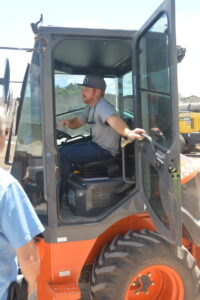 Word of mouth
Word of mouth
Larson’s enthusiasm seems to have spread to other family members. “My brother has a business similar to mine. He bought a Hitachi ZW80, and my brother-in-law bought two ZW80s. Those are open cabs but they bought them pretty much on word of mouth because I liked the ZW50s so much,” Larson says.
And Larson may not be the easiest customer to sell equipment to. “It depends on who shows up and what kind of mood I’m in,” Larson says. Nevertheless, he’s been satisfied in his relationship with his dealer Great South Equipment and the small wheel loaders.
“We had one issue with the loader but they came right out and fixed it. Otherwise, we haven’t had any problems. One loader has about 2,000 hours on it and another is close to 1,100 hours. They’ve been great machines.”
Automotive interests
Like many people who work with heavy equipment, Larson and his son are car enthusiasts. Larry owns a baby-blue ’57 Chevy pickup truck that he had restored and upgraded. His current project is a ’55 Chevrolet Bel Aire, which is undergoing a complete frame-off restoration.
Larson was racing cars when he was 17 and helped his son Justin get started in the sport with the intention of breaking into the ranks of NASCAR. After a few years, Larson realized that NASCAR was going to cost more money than he was comfortable with, so for the time being they’ve backed off on those goals.
“Justin is a marketable kid, and he has talent,” says Larson. “But I didn’t have the $2 million dollars it takes to get my kid a ride with NASCAR. I wasn’t going to mortgage the farm to do that. So I still have two cars but I sold the hauler. And I don’t owe anybody anything.”
Debt free for good reason
Larson’s aversion to debt extends, not just to racing, but to his entire business philosophy. That’s one of the reasons his company weathered the 2008-09 recession with little damage.
“I learned working for my dad, who also had a landscape materials business, to always put some money away for a rainy day,” says Larson. “So, we were able to survive the recession. We slowed down some, but we were still moving right along. We’ve been blessed to keep going. Debt is a real killer.”
And it doesn’t hurt to have a wife who worked in a bank before joining the business. “All she does is save. She never wants to spend,” Larson says, although he means it as a compliment. When asked what’s the number one reason he’s been successful in business, Larson will tell you, “A good wife.”
Location, location, location
Larson has operated out of the same location since starting his business 38 years ago. With access to Clearwater, Palm Harbor and Pinellas Park, landscapers in three counties know it’s easy to get to Larson Topsoil.
“Everything came to us,” says Larson. “Even people further away will drive down to us because we’ve got such a good reputation. And believe it or not, I still sell to customers we had when we started.”
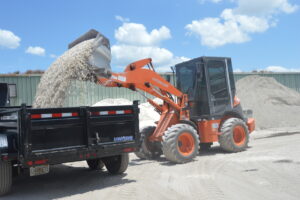 Friends and family program
Friends and family program
Having mostly family and friends of family in the business helps keep Larson Topsoil stable and successful as well.
Finding outside help—people who can drive a truck and run a machine, who will show up on time and work hard—is a struggle for Larson like any other business owner. “I’ve hired some people from the outside but it usually doesn’t work out,” Larson says.
“But Harold in the office, he’s been a family friend for 45 years,” Larson says. “My sister has worked for me from the get-go. My wife left her job to work for us four years into our marriage. Justin has worked for me since his teens and now he’s the general manager. And Aaron Thompson, my nephew, is the yard manager.”
A tight knit crew of family and friends helped bring success to the company. But it also requires flexibility. If you work at Larson Topsoil you do whatever needs to be done, whenever it needs doing, even if you’re the boss.
Some days Larson rarely leaves the office. Somedays he rarely sees it. “Like today, I jumped in a truck and took an order of shell to Oldsmar,” says Larson. “I came back, jumped into another truck, took a load of filler dirt to the northeast section, then came back and jumped into the small wheel loader to pile up a bunch of dirt. Every day is different.”
Compact Equipment Magazine announced its winners for the most outstanding equipment released over the last 12 months- and the ZW50 and ZW80 both made the top of the list!
Simple. The complexity of high tech is not something everyone wants or needs. From the onset, simplicity was the mantra defining the ZW50 and ZW80 compact wheel loaders. Both are equipped with simple mechanical controls and a simple electrical system with no complex, inter-related, dependent systems. They are simple to service machines with engine oil changes extended to 500 hours. Ther’s no DPF to plug, regenerate, maintain, or replace. No SCR or DEF to purchase or fill. There’s a mechanical control lever for intuitive lift and dump functions and a smooth hydrostatic powertrain with rimpull performance and dynamic braking and inching. We could go on, but there’s only so much room.
Click here to read the feature announcing the 2019 Innovative Iron Award win for the ZW50 and ZW80.
CROWD PLEASERS: These Compact Wheel Loaders Are Some of the Most Popular on the Market
Why do certain models of compact wheel loaders outsell others in a manufacturer’s lineup or in the overall market? The answer ranges from models offering market-leading performance to buyers changing direction in their preferences. It’s a sort of dance with compact wheel loaders and buyers taking turns leading.
To read the full article in Compact Equipment featuring interviews with HCMA representatives, click here.
You’re busy. We get it. You don’t have time to read a 2,000-word article on the small wheel loader market. You’ve maybe already decided that it’s not really the machine for you. It’s too expensive. It looks a little too big to easily trailer. Plus, you’re heavily vested in your skid steer attachments. Double plus, the rental lots never seem to have them, so you never get to operate those units. We get that, but just hear us out. compact wheel loaders have many advantages over competitive machine categories: better fuel economy, less tire wear, increased visibility, and beyond. We’ll make this easy on you by quickly breaking down the American market for compact wheel loaders into short, easy-to-digest paragraphs.
To read the article featuring the ZW50 and ZW80 in Compact Equipment Magazine (February 2019), click here.
Fri December 07, 2018 – Northeast Edition #25
CEG
Big Valley Nursery is a nursery/lawn care/garden center located in Glen Head (Long Island), N.Y., that offers a large variety of outdoor products along with landscape supplies, including bulk topsoil, mulch and gravel, to landscapers and homeowners in and around Nassau County.
Of course, any time bulk materials are handled a rubber-tired loader is a must, and to satisfy that need Carmine Capobianco, president of Big Valley Nursery, recently purchased one of the first Hitachi loaders delivered in New York State — a Hitachi model ZW50 with a 1-yard bucket.
The purchase was made from All Island Equipment in Babylon, N.Y.
Big Valley Nursery, which was founded in 1969 by Carmine’s father, Leo Capobianco, has been doing business with All Island Equipment for more than 30 years.
“We first started doing business with All Island Equipment in 1985 and we have accumulated a nice fleet over the course of the years,” Capobianco said. “We currently have, in addition to the Hitachi, six skid steer loaders — made up of Gehl and Takeuchi; a Kobelco mini-excavator; and a Kobelco tractor loader backhoe; a TCM one-yard wheel loader; as well as a Beuthling roller.”
Big Valley Nursery uses every opportunity to keep its fleet well utilized. When the machines are not in use at the nursery, they are available to rent to local contractors and landscapers. In the winter months, Big Valley Nursery sells salt, so machines are typically being used year around.
Thus far the Hitachi ZW50 has left a strong impression with Carmine Capobianco.
“One of my first impressions is that the machine is very quiet,” he said. “I am very happy that we made the investment to have a closed cab. I’m sure I will appreciate it even more as winter settles in. The cab is very comfortable, yet still offers tremendous visibility.
“It’s a little early to tell how the loader will hold up over time, but based on other equipment we have purchased from All Island Equipment in the past, I am sure we will be very satisfied. Satisfaction is the best part of doing business with Gary Wade [president of All Island Equipment] and his family and staff. Our relationship goes back years, and many times Gary has demonstrated his ability to put our relationship ahead of business decisions. By that I mean he always stands behind his product regardless of whether it’s the best thing for his business. He is always accessible and never hides behind a sales rep or a service manager. That is what has kept us coming back.”
For more information on Big Valley Nursery, call 877/887-9619 or visit www.bigvalleynursery.com.
For more information on All Island Equipment, call 631/643-2605 or visit www.allislandequipment.com.
(L-R) are Gary Wade, president of All Island Equipment; and Carmine Capobianco, president of Big Valley Nursery, his grandson, Ronny, and son, Tom Capobianco
